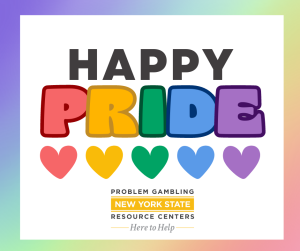Problem Gambling and the LGBTQIA+ Community
Pride Month is celebrated each year in the month of June to commemorate the events at Compton’s Cafeteria, Stonewall and the LGBTQIA+ liberation movement. Pride creates space to acknowledge the challenges faced by Lesbian, Gay, Bisexual, Transgender, Queer, Intersex, and Asexual (LGBTQIA+) identifying folks and is a reminder that we must stand in solidarity with their fight for justice, equity, and acceptance. Join us this Pride in raising awareness on LGBTQIA+ Mental and Behavioral Health. As well as in shedding a light on problem gambling. 
Why It’s Important
While we celebrate Pride month, it is important to talk about the LGBTQIA+ community and problem gambling. Gambling can affect anyone at any time in their life. It does not discriminate and can have negative impacts on your relationships, finances, and more.
LGBTQIA+ individuals often face challenges not encountered by people who identify as heterosexual. As a result of these challenges and other stressors, LGBTQIA+ folks are at increased risk for various mental and behavioral health issues. LGBTIQA+ communities experience poorer health outcomes and reduced social engagement and effectiveness at work due to stigma and discrimination.
Problem Gambling and the LGBTQIA+ Community
While there are not many published research studies specific to LGBTQIA+ and gambling disorder, findings show that certain segments of the LGBTQ+ community have higher prevalence rates of problem gambling than the general population.
Several factors contribute to LGBTQIA+ individuals developing gambling related issues. For many LGBTQ+ individuals, gambling is used as an escape, possibly brought on by one or more of the following:
- History of trauma. (including emotional and physical abuse due to others not accepting their identity)
- Discrimination & social stigma. (over 2/3 of LGBTQIA+ individuals experience discrimination in their lifetime)
- Lack of support. (many hide their identity to avoid discrimination when they do “come out”)
- Internalized homophobia. (low self-esteem and inability to feel comfortable in one’s own skin)
- Co-occurring disorders. (clinical depression, stress, anxiety disorders, and other addictive behaviors)
- Lack of culturally competent care. (fear of seeking help due to a history of homophonic or inappropriate remarks/behaviors by treatment providers)
Screening for Gambling
Many cases of problem gambling and gambling disorder go undetected, due to lack of awareness and screening. Problem gambling screening is crucial for connecting folks to support and preventing suicide.
Studies show one in five individuals living with a gambling problem will attempt or die by suicide – the highest of any addiction. This rate may be higher for LGBTQIA+ adults impacted by problem gambling as LGBTQIA+ adults are at least 3x more likely to report suicidal thoughts, plans and attempts than heterosexual adults in general.
Additionally, risk factors for gambling addiction include those who are prone to using substances, stress, depression and PTSD – all factors known to be more likely among the LGBTQIA+ community.
The Problem Gambling Resource Centers have a Self Screening Tool that can be used to help people decide If they are ready to reach out for support for problems related to gambling.
Where to Get Help
If you or someone you love is having problems with their gambling, know that help is available. There are LGBTQIA+ safe and inclusive resources available for those negatively impacted by gambling. Contact your local Problem Gambling Resource Center (PGRC) to learn more.
